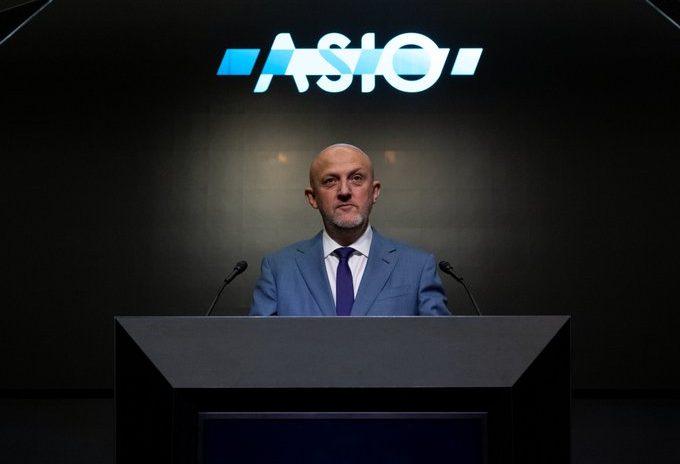
Australian Security Intelligence Organisation (ASIO) Director General Mike Burgess’ Annual Threat Assessment highlighted the principal threats to Australia’s security—in ASIO’s 75th anniversary year.
One of the positives from these public announcements, and this was Burgess’ fifth as DG ASIO, is the documented evolution of national security priorities year to year.
Burgess spoke of the enduring but morphing terrorism threat, as violent extremist ideologies (religiously inspired or racist ‘accelerationists’) switch and merge in the face of current events to create ‘new, hybrid beliefs; a perverse ‘choose your own adventure’ approach to radicalisation’. In ASIO’s assessment ‘there is the realistic possibility of a terrorist attack or attack planning in the next 12 months. POSSIBLE does not mean negligible’. (The national terrorism threat level remains unchanged at POSSIBLE).
Contrary to subsequent newspaper headlines, that doesn’t mean terrorism has re-eclipsed espionage as a threat. In fact, Burgess was categorical: ‘if we had a threat level for espionage and foreign interference it would be at CERTAIN—the highest level possible’. Furthermore, ‘the threat is now, and the threat is deeper and broader than you might think.’
Burgess illustrated this reality by speaking of the ‘A-team’. Not loveable rogues of 80s television nostalgia but rather the Australia Team from an unnamed country’s foreign intelligence service, tasked with recruiting Australians with access to privileged information and the opportunities to covertly influence Australian policy.
On Burgess’ account those efforts, starting in the on-line space, have been persistent, wide-ranging and, unfortunately, sometimes promising. Some Australians have responded positively, either naively or venally, to apparent consultants, researchers and others, promising handsome pay for ‘inside information’ on Australian trade, politics, economics, foreign policy, defence and security matters. The ‘A-team’ then tries to take these new relationships clandestine, shifting to encrypted communications platforms and seeking to meet in foreign locations.
Burgess even recounted the ‘A-team’s successful recruitment of an unnamed Australian politician (and their subsequent proposal to introduce a prime minister’s family member to these spies). As well as an elaborate fake overseas conference orchestrated by the ‘A-team’ specifically to cultivate politicians and academics.
In late 2023, ASIO took counter-intelligence action to disrupt the ‘A-team’, dangling a promising lead to get in front of and then confront their leader, warning them off from targeting Australians. Burgess acknowledged that his publicisation of this hitherto secret information was itself a form of disruption. Turns out the ‘A-team’ leader had neglected to tell his masters of these events and would now need to explain this compromise!
Importantly Burgess, including in response to later Q&A, reflected on this anecdote, refuting ‘suggestions that convictions are the only weapon in our collective arsenal or the only measure of our success’. In doing so he captured the fundamental strategic dynamic at play in the 21st Century intelligence contest.
But it’s not just Australians with privileged access who are the targets of foreign intelligence services. The inter-agency Counter Foreign Interference Taskforce is also required to thwart efforts from foreign governments to surveil and interfere with diaspora communities in Australia, including through violence, blackmail and coercion.
International events, such as Xi Jinping’s authoritarian moves and Russia’s invasion of Ukraine, have caused division in diaspora communities, divisions which can be exploited by foreign intelligence services. It has already happened overseas amongst the Uighur community in Sweden and the Cuban community in the US, to take just two examples.
Australia has not been immune. As Burgess revealed, in 2023 ASIO identified and disrupted a foreign government trying to harm an Australia-based critic of its regime. That government had gone so far as to surveil the target’s home in anticipation of such action. Another foreign government tried to find an Australian willing to ‘disappear’ a separate dissident.
‘Foreign interference’ brings to mind vintage Cold War imagery and, if put on the spot, most people would rattle off the names of the same two or three culprits. But not always. As Burgess observed, threats can come from unhelpful friends as well as Australia’s adversaries. This observation has been borne out in past Australian experiences.
In this regard there was a clear message from Burgess: there is room for open communications and debate with friends, neighbours and even adversaries. However, the looming and growing threat of foreign interference calls for these conversations to be brought out of the shadows, and into the light.
We would also note that Australia must ensure that diaspora communities are protected, and additional support is given to Australians with ethnic, family or business ties to these countries.
Wednesday night’s assessment was overwhelming, especially given Burgess’s identification of sabotage (an original ASIO preoccupation) as re-emergent threat, downstream from both terrorism and espionage & interference via the cyber vector.
However, Burgess was also clear that the last thing Australians should do is throw our hands up. What’s more, as much as ASIO and its partners across government and internationally, can act to identify and disrupt threats (as in the case of the ‘A-team’), the key to national security is the nation itself—through security awareness and actions by individuals, companies and institutions. That means building effective security cultures and practices throughout and across organisations and beyond a single point in time. ASIO, building on its existing protective security advice, will later this year publish a framework ‘to help organisations build and maintain a robust security culture’.
It should also mean Australians, particularly those in business, government, research or otherwise with a security clearance, being wary of sudden interest from supposed ‘headhunters’ bearing gifts.
What we can’t do is do nothing. This was Burgess’s mantra for the night: for the sake of Australia’s future security, ‘BAU* just won’t do’.
*BAU (business as usual).